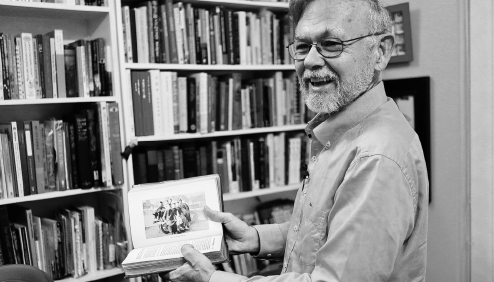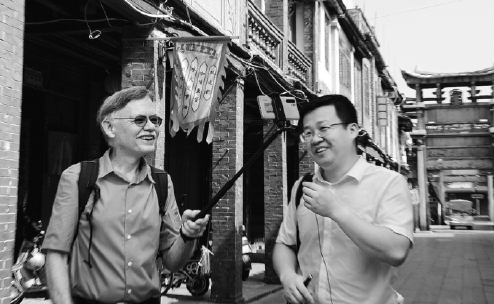A valued visitor who is always made welcome
President hails former member of US Air Force, after book launch, as true witness to country's reform, Luo Wangshu reports.

For William N. Brown, it was a surprise to receive a letter from President Xi Jinping in February 2019. It arrived after he published a book with a collection of his letters to his family back in the United States concerning his three-decade life in China.
Named Off the Wall-How We Fell for China, the book was published in Chinese and English. The president was touched by the author's deep affection for the city where he lives-Xiamen in Fujian province, as well as for the country.
"I feel truly happy and honored to receive a letter from President Xi," says Brown, 65. He didn't expect feedback from Xi after sending the book and a letter to the president.
In the letter to Brown, Xi called him an eyewitness to China's reform and opening-up, and Xi appreciated him having represented Xiamen and Fujian province, and telling stories of China to the world.
Recalling what it was that made a free spirit like Brown, who had lived in more than 30 places before the age of 32, settle in China, he said it was yuanfen-a Chinese word that describes fate.
Fate brought the native of the US to Taiwan as a member of the US Air Force; fate introduced the young man to the Chinese mainland when he was stationed at the island's air force base; fate enabled him and his wife Susan Marie Allison to meet each other at an Easter lunch hosted by a mutual friend from Taiwan; fate again took him to Xiamen in East China's Fujian province-a city he often called Amoy to friends and family back home.
Brown is one of the best known foreigners in Xiamen, though he considers himself a "non-foreigner "and says Xiamen is his second hometown.
He is the city's global calling card.
Since he landed at the "backward little island city", he and his wife Susan Marie lived there for 33 years.
Sadly, she passed away in February in Xiamen. "She said she'd live here her entire life-and she did," Brown says.
Brown has had many roles in life: a special agent with the air force's Office of Special Investigations, a cash-strapped graduate student in the US, a rising entrepreneur with a six-figure annual income in the 1980s, an international student who studied Chinese language at Xiamen University; a business professor at the same university, a host of TV and livestreaming programs, an actor, a writer, and the first foreigner granted permanent residence in Fujian.
All those roles have intertwined and virtually led him to form the backbone of Xiamen University's development of its MBA program and become an educated Western eyewitness who has experienced China's development first hand and factually represents the situation here.
Brown was born in Louisiana in 1956 and raised in the US. As a young boy full of imagination, he dreamed of Australia, Africa and South America.
He applied to emigrate to Australia but was a bit on the young side. The embassy replied he had to wait for 10 years and reapply because he was only 8 years old and needed to be at least 18.
After graduating from high school in Florida, he joined the US Air Force and prayed to be sent to Greenland or anywhere except Asia. But fate took him to Taiwan in 1976, where he spent two years.
He went back to the US and established his own business, before selling it all in 1987, "burning his bridges behind him", in preparation to move to the Chinese mainland.
In 1988, fate came into play again. When he was informed that Xiamen University could offer housing for a foreign language student with a family, Brown moved to Xiamen with his wife and two young sons-one 2 years old, the other 6 months.
Brown had no idea what he would do after his Chinese language study at Xiamen University, but fate paid yet another visit. The new MBA program's sole teacher had just returned to the US for an emergency, and when asked to take his place, Brown agreed. He was skeptical when they said they'd build one of the best programs in China, but both the EMBA and MBA are now among China's Top 10. In 2014, the school widened its horizon by partnering with OneMBA, an international executive MBA program, further engaging with the international community, as Brown had predicted China would do three decades ago.
In 1992, Brown became Fujian province's first foreigner to be granted permanent residence. "Teaching international business in China, and helping to break China's isolation, is as much a road to peace as anything else, and good for both China and the US," he said to the immigration officer.
Brown has not only witnessed and participated in China's accomplishments but has also been sharing them with the other side of the world.
When he arrived in Xiamen, he was "surprised" that the Chinese mainland was nothing like the media portrayed it, although Xiamen still faced water and power outages on a daily basis at that time.
He started to write to family and friends at home to tell them what China was really like.
He wrote about how the Chinese people lived and what their dreams were.
"If you understand the Chinese, you understand China."
The hardest person to convince was his father, a veteran who served in the military for 18 years and fought in Asia for 11 years.
His father was not keen on his decision to move to the Chinese mainland in the first place.
After years of receiving letters from China, his father said he finally understood why Brown came here and had stayed.
"He said he's proud of what I did," Brown says.
From 1988 to 2015, he wrote more than 500 letters, with some vivid illustrations of their lives in China.
The collection of those letters form the basis of his book: Off the Wall-How We Fell for China, which drew praise from Xi.
Receiving the reply from Xi was not Brown's first encounter with the president. During a dinner in 2001, Xi, then governor of Fujian, encouraged Brown to write more books to introduce China to a Western audience.
Brown has since written a dozen books, as well as hosted TV and livestreaming programs about China.
Brown was criticized by some foreigners who said he only knew about the rapid development of coastal areas but ignored the hinterlands.
In 1993, he bought a van to explore the country with his family and, in 1994, they drove over 40,000 kilometers around China, including Beijing, the Inner Mongolia autonomous region, the provinces of Zhejiang and Shandong and through the Gobi Desert to the west of the Tibet autonomous region.
In 2019, Brown again drove around China to gauge the pace of the country's changes in the places he'd visited in 1994. This time, he saw how the world-class infrastructure has helped to lift people, even those in remote areas, from poverty.
"Every place we visited, from the Inner Mongolia autonomous region in the north to the Ningxia Hui autonomous region, Gansu, Qinghai province and the Tibet autonomous region in the west, had beautiful concrete roads," he says.
He recalls that two farmers from remote villages in Ningxia and Yunnan told him: "We were like frogs in a well. Without roads, we could not leave our remote villages to sell products or seek jobs. Today we're free."
Brown is sad to see the recent disagreements and escalation of tensions between China and the US, his two homes.
"In the West, and especially in the US, everything is win-lose. They fear China will take over the world," he says, because historically, this is how Western nations developed.
"But China never dominated far-off nations. Even ancient Chinese people prized peaceful coexistence and prosperity. It's not just a political slogan, it is China's culture and history," Brown adds.
"Someday, we'll understand each other well enough to abandon our tenacious and contagious stereotypes and generalizations," he says.
Zou Shuo contributed to this story.


Today's Top News
- The danger of Japanese PM's 'double standards'
- Death toll rises to 8 in North China factory explosion
- Over 140m train tickets sold for Spring Festival travel rush
- Xi extends Spring Festival greetings to military veterans
- Xi congratulates Fernandez on election as Costa Rican president
- Legacy of Beijing 2022 lives on as Milan welcomes Games






























